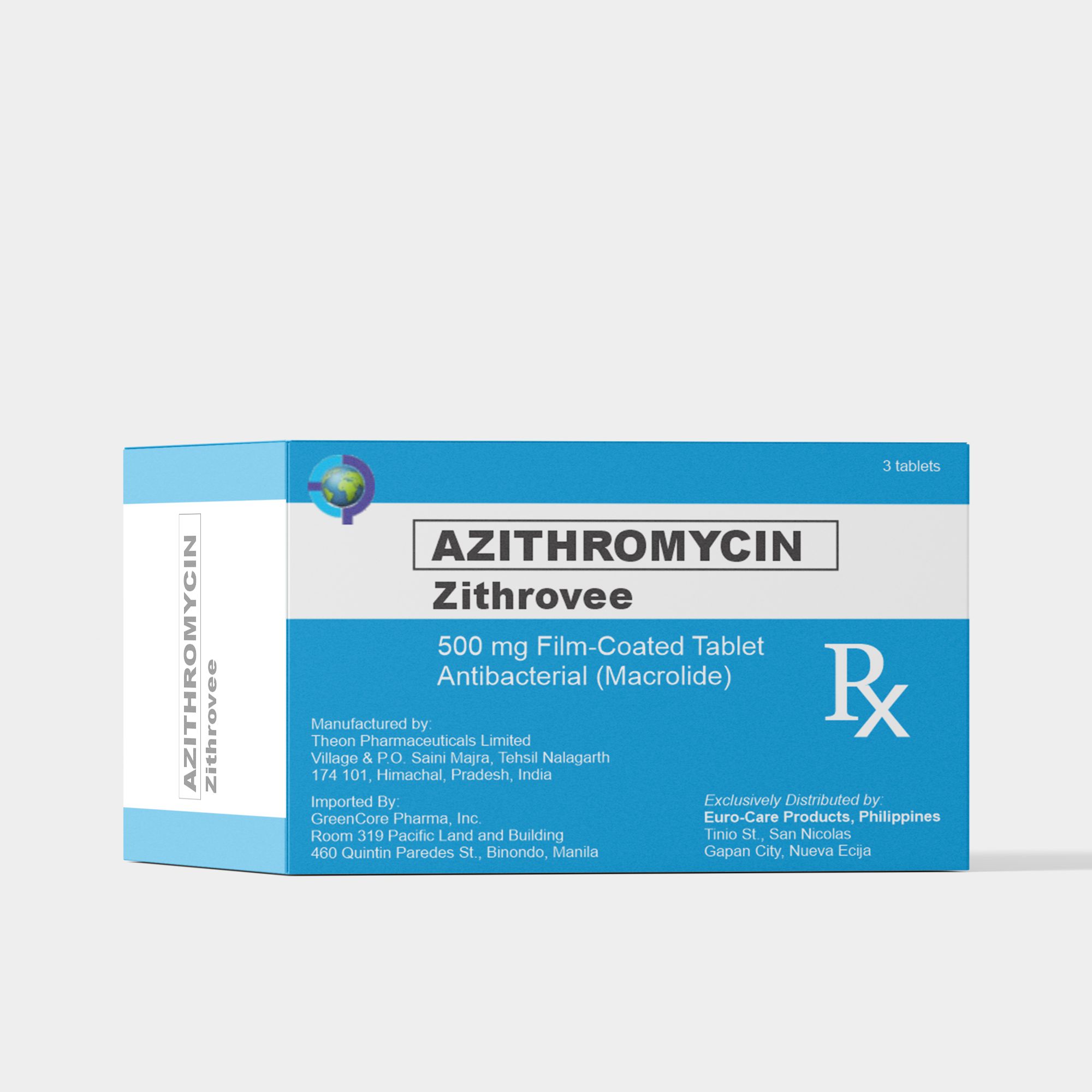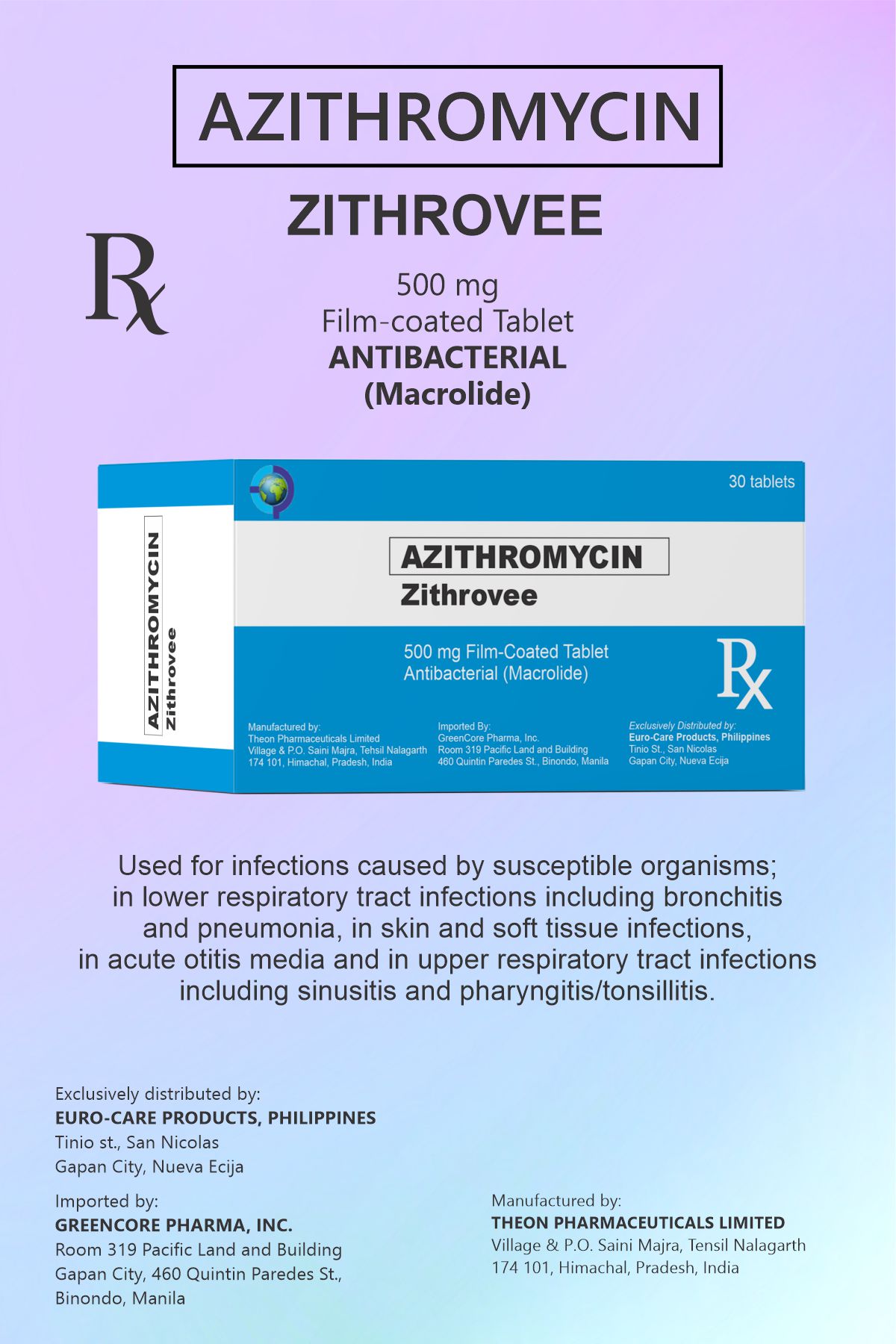Description
Azithromycin, as the dihydrate, is a white crystalline powder with a molecular formula of C38H72N2O12∙2H2O and a molecular weight of 785.0.
Formulation:
Each film-coated tablet contains:
Azithromycin dihydrate USP eq. to anhydrous
azithromycin……….……………………………… 500 mg
Packaging/Availability:
Alu-PVC Blister Pack of 3’s packed in a monocarton( Box of 10’s in monocarton)
Indications & Dosage
Indications:
Azithromycin is indicated for infections caused by susceptible organisms; in lower respiratory tract infections
including bronchitis and pneumonia, in skin and soft tissue infections, in acute otitis media and in upper
respiratory tract infections including sinusitis and pharyngitis/tonsillitis. (Penicillin is the usual drug of choice in the treatment of Streptococcus pyogenes pharyngitis, including the prophylaxis of rheumatic fever.
Azithromycin is generally effective in the eradication of streptococci from the oropharynx however, data
establishing the efficacy of azithromycin and the subsequent prevention of rheumatic fever are not available
at present).In sexually transmitted diseases in men and women, azithromycin is indicated in the treatment of
uncomplicated genital infections due to Chlamydia trachomatis.
It is also indicated in the treatment of chancroid due to Haemophilus ducreyi and uncomplicated genital
infections due to non-multiresistant Neisseria gonorrhoeae; concurrent infection with Treponema pallidum
should be excluded. Azithromycin is indicated, either alone or in combination with rifabutin, for prophylaxis
against Mycobacterium avium- intracellulare complex (MAC) infection, an opportunistic infection prevalent in
patients with advanced human immunodeficiency virus (HIV). Azithromycin is indicated in combination with
ethambutol for the treatment of disseminated MAC (DMAC) infection in patients with advanced HIV infection.
Azithromycin intravenous (IV) is indicated for the treatment of community-acquired pneumonia (CAP) caused
by susceptible organisms, including Legionella pneumophila, in patients who require initial intravenous (IV)
therapy. Azithromycin intravenous (IV) is indicated for the treatment of pelvic inflammatory diseases (PID)
caused by susceptible organisms (Chlamydia trachomatis, Neisseria gonorrhoea, Mycoplasma hominis), in
patients who require initial intravenous (IV) therapy.
Dosage and Administration
Oral azithromycin should be administered as a single daily dose. The period of dosing with regard to
infection is given as follows.
Azithromycin tablets should only be administered to children weighing more than 45 kg.
The safety and efficacy of intravenous azithromycin for the treatment of infections in children have not been
established. Safety and efficacy for the prevention or treatment of MAC in children have not been established. Based on pediatric pharmacokinetic data, a dose of 20 mg/kg would be similar to the adult dose of 1,200 mg but with a higher Cmax.
Elderly: The same dosage as in adult patients is used in the elderly. Elderly patients may be more susceptible to the development of torsades de pointes arrhythmia than younger patients.
In Patients with Renal Impairment: No dose adjustment is necessary in patients with mild to moderate renal impairment (GFR 10-80 mL/min). Caution should be exercised when azithromycin is administered to patients with severe renal impairment (GFR <10 mL/min).
In Patients with Hepatic Impairment: The same dosage as in patients with normal hepatic function may be used in patients with mild to moderate hepatic impairment.
Or as prescribed by the physician.
Administration
Azithromycin tablets can be taken with or without food. The tablets should be swallowed whole.
Distribution
Exclusively Distributed by:
EURO-CARE PRODUCTS, PHILS.
Tinio St., San Nicolas,
Gapan City 3105 Nueva Ecija
Imported by:
GREENCORE PHARMA INC.
Unit 319 Pacific Land Building Quintin Paredes St.,
Binondo, Manila
Manufactured by:
THEON PHARMACEUTICALS LIMITED
Himachal Pradesh, India




Reviews
There are no reviews yet.